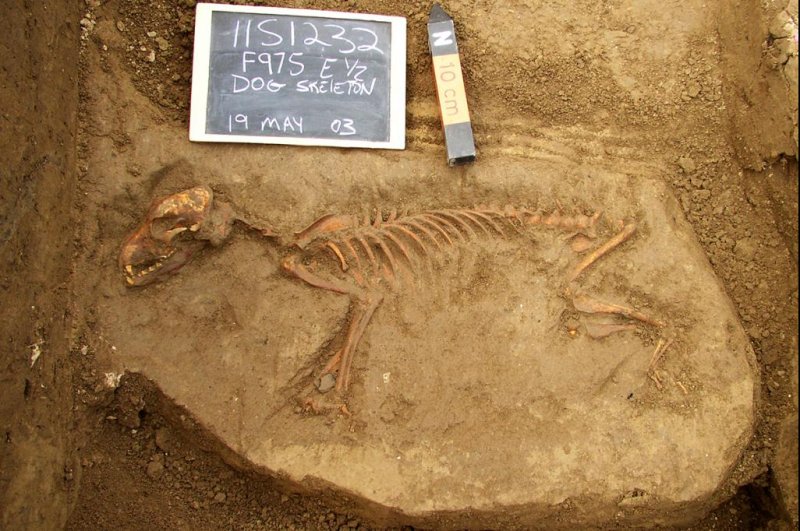Evidence of ritual dog burials suggests humans and dogs have enjoyed a close relationship in the Americas for thousands of years. Photo by Illinois State Archaeological Survey
July 5 (UPI) -- The first dogs in North America came from Siberia, new research proves. The domesticated canines probably followed humans across the land bridge connecting Asia and North America.
The findings -- published this week in the journal Science Advances -- were made possible by the first genomic study of ancient dog DNA.
Scientists sequenced the genomes of ancient dogs using both mitochondrial DNA genes inherited from both parents, and mitochondrial DNA, genes passed from mothers to their offspring. The DNA was collected from the remains of ancient North American and Siberian dogs.
Scientists compared genetic signatures from 71 mitochondrial and seven nuclear genomes, DNA recovered from across the continent and spanning some 9,000 years of genetic history. The results showed a strong link between the earliest North American dogs and Siberian dog lineages.
The genetic analysis also showed the earliest American dogs -- arriving some 9,000 years ago, a few thousand years after the first people showed up -- dispersed across the continent. North American dogs disappeared shortly after the arrival of the first Europeans.
"By looking at genomic data along with mitochondrial data, we were able to confirm that dogs came to the Americas with humans, and that nearly all of that diversity was lost -- most likely as a result of European colonization," Kelsey Witt, who led the mitochondrial DNA genome research as a graduate student at the University of Illinois, said in a news release. "Few modern dogs have any trace of these ancient lineages."
Witt, now a postdoctoral researcher at the University of California, Merced, conducted the research while working in the lab of Illinois anthropology professor Ripan Malhi.
The genomic analysis showed a transmittable cancer still found among some modern dogs is the only genetic heritage left behind by the disappeared North American dog lineages. The dogs' disappearance from the continent is a reminder of the serious threat colonists posed to indigenous communities.
"It is known how indigenous peoples of the Americas suffered from the genocidal practices of European colonists after contact," Malhi said. "What we found is that the dogs of indigenous peoples experienced an even more devastating history and a near-total loss, possibly as a result of forced cultural changes and disease."















